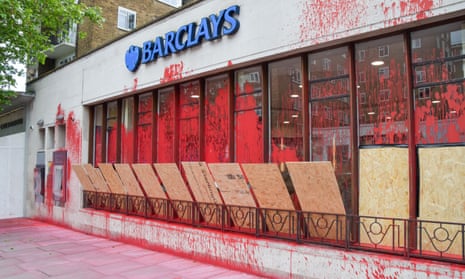Since last October, I have watched with increasing sorrow the humanitarian tragedy unfolding in the Middle East. Within Barclays, a global bank of which I am the chief executive, we have been deeply sympathetic about the overall suffering in the region. We have educated ourselves, contributed to supportive charities and consoled all our own colleagues who have experienced loss.
During this period, there has also been a campaign of disinformation against Barclays. The crux of the allegation is that we finance defence manufacturers and invest in them. Let me be clear about what we do and don’t do. Like other banks in the UK, we finance some companies making defence equipment, alongside their civilian products.
These companies are supported by our democratically elected governments for their role in protecting the UK and allies in Europe. We will not undermine our own national security by de-banking them. We are not an investor in any of these companies, though we occasionally hold shares in them on behalf of our clients.
While we reject false allegations and unreasonable exhortations, we are very willing to discuss them. We are equally accepting of peaceful demonstrations.
However, some activists have been damaging our branches and attacking our staff. Last weekend 20 sites were vandalised across Britain. While these attacks pale in comparison to the devastation in the Middle East, they very much threaten my colleagues.
The anti-defence protests have recently fused with climate activism, but a crucial difference is that our critics on climate have in large part engaged with us and our shareholders peacefully. We have reduced our financed emissions for the energy and power sectors by 44% and 26% respectively in the past three years. This progress was in part mutually accepted only after serious, reasoned discussion.
We all have a right to safety, including in our workplaces. Moreover, the UK is defined by our civil harmony, underwritten by our civic freedoms. I fully support the right to peaceful protest and, indeed, did so myself when I was younger, against institutions that supported apartheid. However, protest must not descend into destruction. Just as we should strive to end suffering and war abroad, we must reject violence at home.
A similar disinformation campaign, though peaceful, has targeted our support of cultural institutions. Individual writers and performers are being pressured to withdraw from festivals because they receive funding from companies such as Barclays.
The UK’s creative and cultural life is world-renowned and respected. Our literary and music festivals are the warp and weft of our cultural life and an important source of sales and exposure for artists. Rejecting funding only hurts their livelihood and our broader culture. Nobody benefits from reduced funding for the arts.
after newsletter promotion
It is important that we restore reason and discourse to our dealings with each other. As a democracy, we have the spaces to debate these issues. Their safety is our security and we must protect them.
